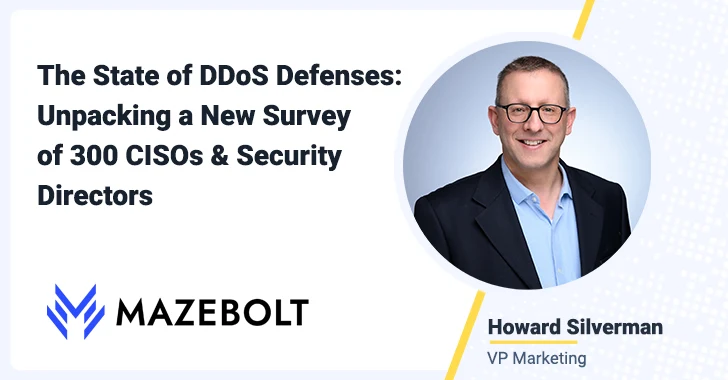
Enterprises are spending more than ever on DDoS defense, but despite the increased investment, organizations are still suffering damaging downtime. MazeBolt’s new DDoS Defense survey, produced in collaboration with Global Surveyz, quizzed 300 CISOs and security directors across the US and Europe, and uncovered some surprising perspectives. The following is a sneak preview from the report.
Inside the Survey
MazeBolt surveyed senior security leaders at banking, financial services, and insurance companies with between 500 and 25,000 employees and annual revenues of at least $250 million. These are organizations where business continuity is critical and where a single outage can cause severe financial and reputational damage.
Attacks Keep Coming – and They’re Costly
Respondents reported an average of 3.85 damaging DDoS incidents in the past year. 60% said they suffered between 2 and 5 such attacks. Larger companies faced the most serious consequences, with enterprises of more than 10,000 employees three times as likely to report extensive damage compared to smaller firms.
Respondents Suffered an Average of 3.85 Damaging Attacks in the Past 12 Months
DDoS – the Cyber Risk that Doesn’t Go Away
There is a significant gap between respondents’ confidence in their deployed DDoS protections and the frequency of damaging DDoS incidents. All respondents reported suffering from at least one damaging DDoS attack – 58% described the impact of the most damaging DDoS attack as moderate, while 42% reported severe or extensive damage that disrupted online services.
42% of Respondents Recently Suffered Severe or Extensive DDoS Damage
Spending More, Yet Still Vulnerable
The survey highlights a troubling disconnect between investment and confidence:
85% of respondents increased their DDoS budgets this year
Only 5% are fully confident in their defenses
99% still rely on periodic manual testing that requires downtime
AI-enhanced DDoS attacks are making traditional testing less effective
85% of Respondents Increased Their DDoS Protection Budgets (Compared to Last 2 Years)
The Automation Gap
CISOs described the degree of automation of their current DDoS protection as:
63% mostly automated
25% half automated
12% mostly manual
0% fully automated
All Respondents Reported Their Current DDoS Protections Rely on Some Manual Intervention
The majority of respondents reported that their DDoS protection is “mostly automated” – and none said that their defenses are fully automated. Practically speaking, this means that although protections block a significant volume of malicious traffic, they continue to require human oversight to manage attacks effectively. This reliance on human intervention creates gaps that attackers can exploit.
DDoS is Still an Active Concern for CISOs
There is a strong demand for a new approach to DDoS vulnerability testing. 97% of respondents said they see value in automated reporting that can identify misconfigurations and vulnerabilities without the need for downtime, yet only 8% are aware that such a solution already exists.
Moreover, the survey underscores a simple but urgent reality: spending more does not guarantee protection. Millions of dollars in investment will not close the resilience gap unless organizations have full visibility and adopt continuous DDoS testing and validation of their deployed defenses. Adoption is a critical means of ensuring that businesses stay online when it matters most.
The full survey on The State of DDoS Defenses is available here.
About the Author: Howard has over 20 years of experience in global marketing and product management with a proven record of building brands and driving business growth. Previously, Howard was the VP of Marketing at CyberProof, being one of the founder members of the leadership team. Prior to that he held leadership marketing positions at Checkmarx, Cisco, NDS and other roles in the B2B technology sector. Howard has a BA in computer science and management, and a Masters of Business Administration.
Howard Silverman — VP Marketing at MazeBolt https://blogger.googleusercontent.com/img/b/R29vZ2xl/AVvXsEgfYvdKGa-SMbl07FVNIcFowB28dUIWyi-cr95nhQzWqCTRYfMasxJxQaTh39nllW-DbqSV0Omif7cffjYu7j_jvBfP_t37vY-X82ooO7A8fn-tbm9_axtZuwyr8WSPISeOKJZ_lB9e_iMBiuwNaoX6_X8DdB5hsGwzi-Y6R6NVsWoqXTLJnr9SNRLltCc/s728-rw-e365/Howard.png



